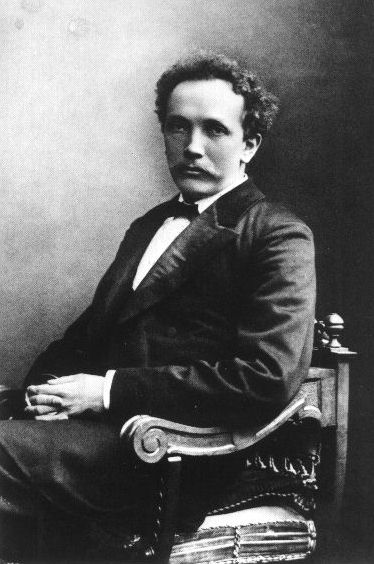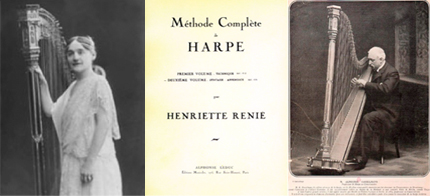2009/07/29
Légende - Henriette Renié
標籤:
音學
近日開始學習一首Renié 的豎琴作品, 在細閱關於這位作曲家的資料時,發現她是一位女豎琴家及作曲家。數算起來,她要算是我認識的第一位女作曲家了。而且在她生活的年代,這可是難能可貴。
在練習她的樂曲時也隱隱感到她的編曲風格有點兒特別。後來了解她生活的年代,剛好是double-action harp 初萌芽的時候,而她是主張使用double action harp 的一群,故不難想像她的作品特別顯示了一些double action harp的特性。
網上找來一些這位少年天才豎琴家的資料與大家分享......
......Henriette Renié (1875-1956) was a French harpist and composer, a deeply religious woman who lived in poverty for much of her life, but who was independent and successful in a time when fame was socially unacceptable for women. She created a method for harp, which is one of the most widely used methods in the harp world today, along with that of Carlos Salzedo.
At five, she saw a concert featuring Alphonse Hasselmans, and declared "That man is going to be my harp teacher." She was not allowed to play harp until she was eight, and then her feet did not reach the pedals. She would hop off her bench to change them and then hop up and continue playing; her father eventually developed pedal extensions for her.
Hasselmans had begun teaching at the Paris Conservatoire, and they met half-way to have lessons at Sebastian Erard's workshop. In 1885, she became a regular student at the Conservatoire. At ten, she won a second prize in harp performance (the committee had actually voted to give her first prize, but the director had decided it was inappropriate), and at eleven, she won the Premier Prix.
Renié began teaching early on; at nine, she had declared her brother's friend Fernand Maignen would play the harp and began teaching him, and following her success at the Conservatoire, students from all over Paris, many of them more than twice her age, began seeking her out.
After her graduation at twelve, she gave performances around France and taught students all over Paris.
At fifteen, Renié gave her first solo recital in Paris. In 1903, she composed another successful piece called Légende based on Les Elfes by Leconte de Lisle.
Her ' Légende ' and the poem on youtube....
More information about Renie's life and her influence: "The Legend of Henriette Renié "
http://books.google.com.hk/books?id=1kcdYpZ8GYQC&pg=PA60&dq=Reni%C3%A9+legende
2009/07/26
人體使用手冊/吳清忠著
人體使用手冊/吳清忠著
http://su5118.myweb.hinet.net/Handbook.htm (全文)
早在半年前已有朋友推介這本書, 並提供了網上版給我. 只因自己喜歡看eBook, iPhone 又未找到一套好的eBook軟件, 所以遲遲未開始閱讀.
直至近日終於找到一套iPhone eBook 軟件(Stanza), 效果不錯, 所以又開始了閱讀生涯. 雖然我並不完全認同書中的看法, 但作者能用現代人的語言來解釋一些中醫的道理, 也令我對人體有多一重的體會.
作者:
吳清忠先生,特別強調,人體是極有智慧、具自療能力的系統,應順應這個機制,以達養生健身的目的。
一式三招(飯後一小時內不要做,晚上十一點後也不做):
1. 壓膀胱經的 "崑崙穴"(左右兩點)1~3分鐘
2. 壓任脈的 "膻中穴"(意念按摩 )1~3分鐘
3. 壓心包經的 "天池穴"(左右兩點)1~3分鐘
4. 敲膽經,大腿外側四點,各50下。
最重要的是,務必「早睡」,強化造血功能。晚上十點前休息,而早上是睡到自然醒。
還有一項甩手運動 ,若自己按摩心包絡不容易時,可以做甩手運動,亦能疏通心包絡。
以下節錄了書中一段序言讓大家了解作者的寫作和解釋風格:
● 人體的電壓是什麼?
電腦技術是這個世紀多數人都能了解的,從系統結構來看,人和電腦有許多基本的架構是非常類似的。因此,我經常用一個大家都熟悉的個人電腦例子來說明人體疾病的原因。
現代個人電腦的電源供給器,都使用電子式的,打開操作手冊中的規格,可以看到電壓允許有上下百分之三十五的浮動。因此,一部額定電壓為 110 伏特的計算機,當外界電源的電壓下降到 70 伏特時,是允許額度中的下限,理論上個人電腦還可以正常運行 ( 當然品質太差的除外 )。但是當電壓下降到 60 伏特時,超過了下限,系統可能就會出現問題,假設磁碟機這個時候出了問題。工程師應該處理那個部份? 是電源還是磁碟機? 答案非常清楚。
在電子工程師眼裡這是一個很簡單的笨問題,一個受過基本訓練的電子工程師,修理個人電腦的第一個步驟就是量量電源電壓,很快的就會發現是電壓的問題。等電壓調到正常範圍以後,再看看磁碟機是不是還有問題。多數情形磁碟機始終是好的,只要電壓正常了,問題也就解決了。
如果相同的情形發生在人體上,就不再是一個笨問題了。磁碟機就像是人體的一個器官,在這個例子我們假設是腎臟,用前面電子工程師修個人電腦的邏輯來思考,問題就大了。第一個問題是“人體的電壓”是什麼? 沒有電壓可以量,就沒有證據說明是能量水平有問題,而各種證據又顯示磁碟機 ( 腎臟 ) 壞了,當然是修磁碟機了,也就是修理腎臟。於是用上了各種治療腎臟病的藥,甚至還把腎臟割了換個新的都無濟於事,很可能多數割掉的腎臟根本就是好的。( 這聽起來有點毛骨悚然,不過真實的醫學就是這麼做的 )
由於至今醫學上沒有任何一個指標是用來測量人體能量水平的,從這個角度來說,現代醫學和電子學相比,還在尚未發現電壓的年代,沒有發現電壓當然電子學也就無從發展了。 .........
continue reading "人體使用手冊/吳清忠著"
http://su5118.myweb.hinet.net/Handbook.htm (全文)
早在半年前已有朋友推介這本書, 並提供了網上版給我. 只因自己喜歡看eBook, iPhone 又未找到一套好的eBook軟件, 所以遲遲未開始閱讀.
直至近日終於找到一套iPhone eBook 軟件(Stanza), 效果不錯, 所以又開始了閱讀生涯. 雖然我並不完全認同書中的看法, 但作者能用現代人的語言來解釋一些中醫的道理, 也令我對人體有多一重的體會.
作者:
吳清忠先生,特別強調,人體是極有智慧、具自療能力的系統,應順應這個機制,以達養生健身的目的。
一式三招(飯後一小時內不要做,晚上十一點後也不做):
1. 壓膀胱經的 "崑崙穴"(左右兩點)1~3分鐘
2. 壓任脈的 "膻中穴"(意念按摩 )1~3分鐘
3. 壓心包經的 "天池穴"(左右兩點)1~3分鐘
4. 敲膽經,大腿外側四點,各50下。
最重要的是,務必「早睡」,強化造血功能。晚上十點前休息,而早上是睡到自然醒。
還有一項甩手運動 ,若自己按摩心包絡不容易時,可以做甩手運動,亦能疏通心包絡。
以下節錄了書中一段序言讓大家了解作者的寫作和解釋風格:
● 人體的電壓是什麼?
電腦技術是這個世紀多數人都能了解的,從系統結構來看,人和電腦有許多基本的架構是非常類似的。因此,我經常用一個大家都熟悉的個人電腦例子來說明人體疾病的原因。
現代個人電腦的電源供給器,都使用電子式的,打開操作手冊中的規格,可以看到電壓允許有上下百分之三十五的浮動。因此,一部額定電壓為 110 伏特的計算機,當外界電源的電壓下降到 70 伏特時,是允許額度中的下限,理論上個人電腦還可以正常運行 ( 當然品質太差的除外 )。但是當電壓下降到 60 伏特時,超過了下限,系統可能就會出現問題,假設磁碟機這個時候出了問題。工程師應該處理那個部份? 是電源還是磁碟機? 答案非常清楚。
在電子工程師眼裡這是一個很簡單的笨問題,一個受過基本訓練的電子工程師,修理個人電腦的第一個步驟就是量量電源電壓,很快的就會發現是電壓的問題。等電壓調到正常範圍以後,再看看磁碟機是不是還有問題。多數情形磁碟機始終是好的,只要電壓正常了,問題也就解決了。
如果相同的情形發生在人體上,就不再是一個笨問題了。磁碟機就像是人體的一個器官,在這個例子我們假設是腎臟,用前面電子工程師修個人電腦的邏輯來思考,問題就大了。第一個問題是“人體的電壓”是什麼? 沒有電壓可以量,就沒有證據說明是能量水平有問題,而各種證據又顯示磁碟機 ( 腎臟 ) 壞了,當然是修磁碟機了,也就是修理腎臟。於是用上了各種治療腎臟病的藥,甚至還把腎臟割了換個新的都無濟於事,很可能多數割掉的腎臟根本就是好的。( 這聽起來有點毛骨悚然,不過真實的醫學就是這麼做的 )
由於至今醫學上沒有任何一個指標是用來測量人體能量水平的,從這個角度來說,現代醫學和電子學相比,還在尚未發現電壓的年代,沒有發現電壓當然電子學也就無從發展了。 .........
2009/07/23
姚斯婷 - Eternal Singing Endless Love VII
標籤:
音學
若你喜歡陳潔麗的歌聲及那凊純的編曲, 你也會喜歡她.....姚斯婷 - Eternal Singing Endless Love VII
為愛而生的音樂,旋律優美、節奏迷離。溫柔的聲音,永無的惆悵,為愛而生為愛而死的澎湃激情,在歌聲中含蓄地表達出來。專輯中這些好久沒有聽過的經典英文歌曲,由心抒發的唯美情歌,耳過縈繞著愛的召喚,宛如倘徉在原始森林的懷抱中,感受著那份最澄澈的呼吸。歌聲給予你精神的凈化和心結的解脫,歌聲化為永遠的柔情似水,超越時間,使你心靈悸動難以忘懷。
這是一把注定讓人難以忘記的聲音、這是一種久違的清純、淡雅的歌聲、這是融入華人文化情感的經典英文情歌演唱專輯,讓我們欣喜、觸動、舒適。姚斯婷擁有一把好嗓音,英語發音純正、地道、元音飽滿,歌唱流暢、優美、清甜,很富於抒情的色彩,歌曲以原聲器樂的伴奏為主,立意清新、風格暢快,具有獨特的藝術韻味!
(Source: http://fjthk.now.cn:7751/www.21hifi.com/cdhifi/20080611/2.htm)
2009/07/20
2009/07/17
窮得只剩下錢
標籤:
好書好網
窮得只剩下錢

人生兩條路──生活的路與生命的路。生活的路追求食衣住行、功名富貴;生命的路追求平安喜樂、永恆的歸宿。我們這兩條路都要走。如果生活的路富有,而生命的路貧窮,則雖然豐衣足食卻不安空虛,這就掉入「窮得只剩下錢」的困境。這本書的價值在於為我們釐清這兩條路。
2008年的最後一天,翻開台灣各大媒體,頭版出現了一條令人突兀又忍俊不住的新聞。陳致中探望再次被羈押的父親前總統陳水扁先生時,手裡拿著一本《窮得只剩下錢》的書要送給他,此事被一旁眼尖的守候媒體發現時,大家面面相覷之餘,隨即發出爆笑。窮得只剩下錢?對許多人而言,這顯然正符合前第一家庭的描述,他們的確有很多很多的錢,媒體常以海角七億形容之,但其餘呢?他們還剩下了什麼?
"窮得只剩下錢" 這是一本從「現實人生」切入,來帶到「生命信仰」的書,並以「生命的原則是追求幸福」為主軸,透過三個問題來貫穿整本書。這三個問題是:
1.人為什麼沒有平安?
2.人如何跳出無奈的困境?
3.人如何追求幸福的進深?
書中以一連串人類核心的需求與省思,諸如「人性是什麼?人活著到底是為什麼?我是誰?人存在的終極意義是什麼?」,來帶出一套明確、簡單、清晰、具體可操作的「生命經營系統」。
關於如何走好生活的路,我們的社會在這方面的好書,非常普遍,但關於如何走好生命的路,卻較不普遍。而這本書不僅為我們釐清生活與生命的分際,還為我們清楚解說如何走好生命的路。為了自己的幸福,非常值得一讀。
希望人人都能把握到真正的幸福,不要一生奮鬥下來,落得「只剩下帶不走的錢」,唯獨遺漏永不分離的「幸福的源頭」。 窮得只剩下錢?但願這不只是前第一家庭的覺悟,也是你、我共同的覺悟。
(Source:http://www.books.com.tw/exep/prod/booksfile.php?item=0010407656#intro)
continue reading "窮得只剩下錢"

人生兩條路──生活的路與生命的路。生活的路追求食衣住行、功名富貴;生命的路追求平安喜樂、永恆的歸宿。我們這兩條路都要走。如果生活的路富有,而生命的路貧窮,則雖然豐衣足食卻不安空虛,這就掉入「窮得只剩下錢」的困境。這本書的價值在於為我們釐清這兩條路。
2008年的最後一天,翻開台灣各大媒體,頭版出現了一條令人突兀又忍俊不住的新聞。陳致中探望再次被羈押的父親前總統陳水扁先生時,手裡拿著一本《窮得只剩下錢》的書要送給他,此事被一旁眼尖的守候媒體發現時,大家面面相覷之餘,隨即發出爆笑。窮得只剩下錢?對許多人而言,這顯然正符合前第一家庭的描述,他們的確有很多很多的錢,媒體常以海角七億形容之,但其餘呢?他們還剩下了什麼?
"窮得只剩下錢" 這是一本從「現實人生」切入,來帶到「生命信仰」的書,並以「生命的原則是追求幸福」為主軸,透過三個問題來貫穿整本書。這三個問題是:
1.人為什麼沒有平安?
2.人如何跳出無奈的困境?
3.人如何追求幸福的進深?
書中以一連串人類核心的需求與省思,諸如「人性是什麼?人活著到底是為什麼?我是誰?人存在的終極意義是什麼?」,來帶出一套明確、簡單、清晰、具體可操作的「生命經營系統」。
關於如何走好生活的路,我們的社會在這方面的好書,非常普遍,但關於如何走好生命的路,卻較不普遍。而這本書不僅為我們釐清生活與生命的分際,還為我們清楚解說如何走好生命的路。為了自己的幸福,非常值得一讀。
希望人人都能把握到真正的幸福,不要一生奮鬥下來,落得「只剩下帶不走的錢」,唯獨遺漏永不分離的「幸福的源頭」。 窮得只剩下錢?但願這不只是前第一家庭的覺悟,也是你、我共同的覺悟。
(Source:http://www.books.com.tw/exep/prod/booksfile.php?item=0010407656#intro)
2009/07/14
2009/07/11
史特勞斯的黃昏 - 《四首最後的歌》
標籤:
音學
史特勞斯的黃昏

浪漫的史特勞斯在1930年代後開始尋求較為平靜的生活,他繼續從事指揮的工作,卻因後來納粹事件,讓他無法與他的猶太人編劇繼續合作,讓他頗為沮喪。
二次大戰期間,他與納粹支持者處的水火不容,還必須保護他的猶太媳婦。當他的劇院因德軍撤退被燒毀時,史特勞斯譜寫了一首由二十三把絃樂器所構成的弦樂曲《變形》,算是哀悼所有在戰爭中失去的一切吧。
戰後史特勞斯生活困難, 曾靠抄寫自己的樂曲維生。最後一首作品《四首最後的歌》於戰後發表,最初整套是五首的, 但因他健康問題, 只能完成四首, 曲中傳達一種寧靜、溫柔、信心、聽從天命的情境。
The Four Last Songs (German: Vier letzte Lieder) for soprano and orchestra were the final completed works of Richard Strauss, composed in 1948 when the composer was 84.
The songs deal with death and were written shortly before Strauss himself died. However, instead of the typical Romantic defiance, these Four Last Songs are suffused with a sense of calm, acceptance, and completeness.
The settings are for a solo soprano voice given remarkable soaring melodies against a full orchestra, and all four songs have prominent horn parts. The combination of a beautiful vocal line with supportive brass accompaniment references Strauss's own life: His wife Pauline de Ahna was a famous soprano and his father Franz Strauss a professional horn player.
(Source: www.wikipedia.org)
Nun der Tag mich müd gemacht
Nun der Tag mich müd gemacht,
soll mein sehnliches Verlangen
freundlich die gestirnte Nacht
wie ein müdes Kind empfangen.
Hände, laßt von allem Tun,
Stirn, vergiß du alles Denken,
alle meine Sinne nun
wollen sich in Schlummer senken.
Und die Seele unbewacht
will in freien Flügen schweben,
um im Zauberkreis der Nacht
tief und tausendfach zu leben.
*****************************
While going to sleep
Now that the day has made me so tired,
my dearest longings shall
be accepted kindly by the starry night
like a weary child.
Hands, cease your activity,
head, forget all of your thoughts;
all my senses now
will sink into slumber.
And my soul, unobserved,
will float about on untrammeled wings
in the enchanted circle of the night,
living a thousandfold more deeply.
continue reading "史特勞斯的黃昏 - 《四首最後的歌》"
浪漫的史特勞斯在1930年代後開始尋求較為平靜的生活,他繼續從事指揮的工作,卻因後來納粹事件,讓他無法與他的猶太人編劇繼續合作,讓他頗為沮喪。
二次大戰期間,他與納粹支持者處的水火不容,還必須保護他的猶太媳婦。當他的劇院因德軍撤退被燒毀時,史特勞斯譜寫了一首由二十三把絃樂器所構成的弦樂曲《變形》,算是哀悼所有在戰爭中失去的一切吧。
戰後史特勞斯生活困難, 曾靠抄寫自己的樂曲維生。最後一首作品《四首最後的歌》於戰後發表,最初整套是五首的, 但因他健康問題, 只能完成四首, 曲中傳達一種寧靜、溫柔、信心、聽從天命的情境。
The Four Last Songs (German: Vier letzte Lieder) for soprano and orchestra were the final completed works of Richard Strauss, composed in 1948 when the composer was 84.
The songs deal with death and were written shortly before Strauss himself died. However, instead of the typical Romantic defiance, these Four Last Songs are suffused with a sense of calm, acceptance, and completeness.
The settings are for a solo soprano voice given remarkable soaring melodies against a full orchestra, and all four songs have prominent horn parts. The combination of a beautiful vocal line with supportive brass accompaniment references Strauss's own life: His wife Pauline de Ahna was a famous soprano and his father Franz Strauss a professional horn player.
(Source: www.wikipedia.org)
Youtube video - Renee Fleming sings the third of Richard Strauss' 'Vier letzte lieder'. Luzerne, 2004. Conductor: Claudio Abbado.
Nun der Tag mich müd gemacht
Nun der Tag mich müd gemacht,
soll mein sehnliches Verlangen
freundlich die gestirnte Nacht
wie ein müdes Kind empfangen.
Hände, laßt von allem Tun,
Stirn, vergiß du alles Denken,
alle meine Sinne nun
wollen sich in Schlummer senken.
Und die Seele unbewacht
will in freien Flügen schweben,
um im Zauberkreis der Nacht
tief und tausendfach zu leben.
*****************************
While going to sleep
Now that the day has made me so tired,
my dearest longings shall
be accepted kindly by the starry night
like a weary child.
Hands, cease your activity,
head, forget all of your thoughts;
all my senses now
will sink into slumber.
And my soul, unobserved,
will float about on untrammeled wings
in the enchanted circle of the night,
living a thousandfold more deeply.
2009/07/08
Richard Strauss - Morgen
標籤:
音學
"Morgen" 是史特勞斯的歌曲中自己最喜歡的. 它不單旋律優美, 還是作曲家送給太太的結婚禮物, 倍添浪漫.......
Among Strauss's lieder, "Morgen" is the one I love most.
One day, may be William can play the violin and I play the harp to sing with this romantic song!
Morgen!, Op. 27 No. 4, is the last in a set of four songs based on the love poem written by John Henry Mackay. Strauss met Mackay in Berlin, and set "Morgen!" to music on 21 May 1894.
It was the one of his four lieder Opus 27, a wedding present to his wife Pauline. This song remains one of Strauss's well-known and widely recorded works, and one of his most beautiful songs.
Below a video recording sung by Anna Netrebko.
http://www.youtube.com/watch?v=LyUv7S9G50Q&feature=player_embedded
continue reading "Richard Strauss - Morgen"
Among Strauss's lieder, "Morgen" is the one I love most.
One day, may be William can play the violin and I play the harp to sing with this romantic song!
Morgen!, Op. 27 No. 4, is the last in a set of four songs based on the love poem written by John Henry Mackay. Strauss met Mackay in Berlin, and set "Morgen!" to music on 21 May 1894.
It was the one of his four lieder Opus 27, a wedding present to his wife Pauline. This song remains one of Strauss's well-known and widely recorded works, and one of his most beautiful songs.
Below a video recording sung by Anna Netrebko.
http://www.youtube.com/watch?v=LyUv7S9G50Q&feature=player_embedded
Although this recording is a bit old, it's sung by Janet Baker with harp and violin accompliment. Hope you'll like it too! 
http://www.youtube.com/watch?v=DJZeqcdg5iI&feature=player_embedded
Morgen
Und morgen wird die Sonne wieder scheinen,
und auf dem Wege, den ich gehen werde,
wird uns, die [Seligen]1, sie wieder einen
inmitten dieser sonnenatmenden Erde . . .
Und zu dem Strand, dem weiten, wogenblauen,
werden wir still und langsam niedersteigen,
stumm werden wir uns in die Augen schauen,
und auf uns sinkt des Glückes [grosses]2 Schweigen. . .
[ text in German by John Henry Mackay (1864-1933)]
Tomorrow
And tomorrow the sun will shine again,
and on the path I will take,
it will unite us again, we happy ones,
upon this sun-breathing earth...
And to the shore, the wide shore with blue waves,
we will descend quietly and slowly;
we will look mutely into each other's eyes
and the silence of happiness will settle upon us.
[Translation from German to English copyright © by Emily Ezust ]
http://www.youtube.com/watch?v=DJZeqcdg5iI&feature=player_embedded
Morgen
Und morgen wird die Sonne wieder scheinen,
und auf dem Wege, den ich gehen werde,
wird uns, die [Seligen]1, sie wieder einen
inmitten dieser sonnenatmenden Erde . . .
Und zu dem Strand, dem weiten, wogenblauen,
werden wir still und langsam niedersteigen,
stumm werden wir uns in die Augen schauen,
und auf uns sinkt des Glückes [grosses]2 Schweigen. . .
[ text in German by John Henry Mackay (1864-1933)]
Tomorrow
And tomorrow the sun will shine again,
and on the path I will take,
it will unite us again, we happy ones,
upon this sun-breathing earth...
And to the shore, the wide shore with blue waves,
we will descend quietly and slowly;
we will look mutely into each other's eyes
and the silence of happiness will settle upon us.
[Translation from German to English copyright © by Emily Ezust ]
2009/07/05
Richard Strauss and his lieder
標籤:
音學
Richard Strauss (1864-1979) and his lieder

理查‧史特勞斯(Richard Strauss)生於慕尼黑,其父親是個法國號演奏家,給了他一個很好的音樂環境,自六歲起就開始學習鋼琴、小提琴、音樂理論與作曲。與華格納的姪女莉特結婚後,加上平日的耳濡目染,逐漸感染了華格納的風格。
當我們想到理查施特勞斯( 1864年至1949年)的作品時 ,總會是他的大型歌劇如瑰騎士和音樂詩(Tone poems)。然而,他也寫了200首情意綿綿歌曲,其大多數歌曲於1906年前是為他的妻子而寫的。然而施特勞斯於1906年和1918年間卸沒有再寫歌曲,這不僅是因為他專注於歌劇,而且還因為他與出版商的一個版權糾紛。
Richard Strauss (1864-1949)
When we think of Richard Strauss (1864-1949), it is usually associated with his large-scale operas and tone poems. Yet he also wrote over two hundred songs, many of them of exceeding intimacy. The majority of the songs Strauss wrote before 1906 were intended to be performed by his wife, Pauline de Ahna, with him at the piano. Between 1906 and 1918, Strauss wrote no songs at all, not only because he was concentrating on opera but also because of a simmering copyright dispute with the publisher Bote & Bock.
Acht Lieder aus Letzte Blätter, op. 10
This song cycle was composed when Richard Strauss was 21. "Zueignung" and "Allerseelen" are the first and last, respectively, of the "Acht Lieder aus Letzte Blätter, op. 10" from 1885, with texts by Hermann von Gilm zu Rosenegg (1812-1864).
Zueignung(Opus 10, No. 1)
"Zueignung," the three verses open similarly but each develops differently building to an emotional climax at the end. Each verse begins in the same way, but through a series of ingenious twists to the melodic and harmonic direction, Strauss achieves an extraordinary build-up of emotional temperature, which culminates at the close in explosive gratitude to the absent lover.
Ja, du weißt es, teure Seele, dass ich fern von dir mich quäle, Liebe macht die Herzen krank, Habe Dank.
Einst hielt ich, der Freiheit Zecher, Hoch den Amethysten-Becher, Und du segnetest den Trank, Habe Dank.
Und beschworst darin die Bösen, bis ich, was ich nie gewesen, heilig, heilig an's Herz dir sank, Habe Dank.
********************************************
Yes, you know, dear heart, that far from you I am tormented. Love makes the heart sick - thank you!
Once, revelling in liberty, I raised high a goblet of amethyst, and you blessed the draught - thank you!
And you banished the evil away, till I was purified as never before, and sank onto your breast - thank you!
Allerseelen(Opus 10, No.10)
"Allerseelen" is a richly ornamented evocation of lost love. It is the last of the set, has a rich atmosphere, evoking reminiscences of love. The text is ambiguous at first and it is not until the final stanza that the mention of flowers on a grave confirms that the poet is mourning a dead lover. -----
Stell auf den Tisch die duftenden Reseden,
Die letzten roten Astern trag herbei,
Und laß uns wieder von der Liebe reden,
Wie einst im Mai.
Gib mir die Hand, daß ich sie heimlich drücke
Und wenn man's sieht, mir ist es einerlei,
Gib mir nur einen deiner süßen Blicke,
Wie einst im Mai.
Es blüht und heut auf jedem Grabe,
Ein Tag im Toten frei,
Komm an mein Herz, daß ich dich wieder habe,
Wie einst im Mai.
*************************************
Lay on the table the fragrant mignonette and the last red asters, and let us speak again of love, like once in May!
Give me your hand that I may press it secretly - and if anyone should see, what does it matter? Then give me just one sweet glance, like once in May!
Today each grave is fragrant with flowers. For one day in the year the dead are free. Come to my heart that I may hold you again, like once in May.
continue reading "Richard Strauss and his lieder"

理查‧史特勞斯(Richard Strauss)生於慕尼黑,其父親是個法國號演奏家,給了他一個很好的音樂環境,自六歲起就開始學習鋼琴、小提琴、音樂理論與作曲。與華格納的姪女莉特結婚後,加上平日的耳濡目染,逐漸感染了華格納的風格。
當我們想到理查施特勞斯( 1864年至1949年)的作品時 ,總會是他的大型歌劇如瑰騎士和音樂詩(Tone poems)。然而,他也寫了200首情意綿綿歌曲,其大多數歌曲於1906年前是為他的妻子而寫的。然而施特勞斯於1906年和1918年間卸沒有再寫歌曲,這不僅是因為他專注於歌劇,而且還因為他與出版商的一個版權糾紛。
Richard Strauss (1864-1949)
When we think of Richard Strauss (1864-1949), it is usually associated with his large-scale operas and tone poems. Yet he also wrote over two hundred songs, many of them of exceeding intimacy. The majority of the songs Strauss wrote before 1906 were intended to be performed by his wife, Pauline de Ahna, with him at the piano. Between 1906 and 1918, Strauss wrote no songs at all, not only because he was concentrating on opera but also because of a simmering copyright dispute with the publisher Bote & Bock.
Acht Lieder aus Letzte Blätter, op. 10
Zueignung(Opus 10, No. 1)
"Zueignung," the three verses open similarly but each develops differently building to an emotional climax at the end. Each verse begins in the same way, but through a series of ingenious twists to the melodic and harmonic direction, Strauss achieves an extraordinary build-up of emotional temperature, which culminates at the close in explosive gratitude to the absent lover.
Ja, du weißt es, teure Seele, dass ich fern von dir mich quäle, Liebe macht die Herzen krank, Habe Dank.
Einst hielt ich, der Freiheit Zecher, Hoch den Amethysten-Becher, Und du segnetest den Trank, Habe Dank.
Und beschworst darin die Bösen, bis ich, was ich nie gewesen, heilig, heilig an's Herz dir sank, Habe Dank.
********************************************
Yes, you know, dear heart, that far from you I am tormented. Love makes the heart sick - thank you!
Once, revelling in liberty, I raised high a goblet of amethyst, and you blessed the draught - thank you!
And you banished the evil away, till I was purified as never before, and sank onto your breast - thank you!
Allerseelen(Opus 10, No.10)
"Allerseelen" is a richly ornamented evocation of lost love. It is the last of the set, has a rich atmosphere, evoking reminiscences of love. The text is ambiguous at first and it is not until the final stanza that the mention of flowers on a grave confirms that the poet is mourning a dead lover. -----
Stell auf den Tisch die duftenden Reseden,
Die letzten roten Astern trag herbei,
Und laß uns wieder von der Liebe reden,
Wie einst im Mai.
Gib mir die Hand, daß ich sie heimlich drücke
Und wenn man's sieht, mir ist es einerlei,
Gib mir nur einen deiner süßen Blicke,
Wie einst im Mai.
Es blüht und heut auf jedem Grabe,
Ein Tag im Toten frei,
Komm an mein Herz, daß ich dich wieder habe,
Wie einst im Mai.
*************************************
Lay on the table the fragrant mignonette and the last red asters, and let us speak again of love, like once in May!
Give me your hand that I may press it secretly - and if anyone should see, what does it matter? Then give me just one sweet glance, like once in May!
Today each grave is fragrant with flowers. For one day in the year the dead are free. Come to my heart that I may hold you again, like once in May.
2009/07/02
豎琴考試
標籤:
音學
豎琴考試
剛收到豎琴考試的成績。
幸運地順利過關,而且還是一個令我喜出望外的成績。確實令我非常雀躍和十分鼓舞!
雖然已一把年紀的我可算是身經百戰,這些年來曾經面對過不少不同種類的考試。有些朋友最怕駕車考試,而我就對音樂考試始終是最沒有信心的。因為自己常常認為樂曲演奏的最基本要求應是準確度, 然後就是表達和演譯. 而對我只擁有fuzzy思維的人, 要有百分百準確的演奏實在有點難度! 所以考試時每每有一些錯音都令我非常擔心會不及格. 這次當然也有錯音和失準的地方, 但仍可有不錯的成績令我對音樂試添多了少許信心!
今次見笑地只是三級考試, 說實話我從未考過三級的. 鋼琴是五級而聲樂一開始便考六級, 但發現原來緊張情度是一樣的. 選擇三級是學琴時間太短, 很多技術未能好好掌握. 但是又希望可以考考試來證明購買這件昂貴樂器是沒有錯的! 只是這次成績還要多謝聲樂老師多年的教導, 令我可以點滴存留一些音樂知識和歌唱技巧, 讓oral可獲取滿分. 豎琴老師的鼓勵也增添了我sight-read的信心, 令我在sight-read中居然是'Almost all correct'的評語而不是在五級鋼琴試中的"A bit careless in design!!!"
考官在最後評語還鼓勵我努力學豎琴, 但不要放棄歌唱呢!

人生在有限的時間知資源下可以努力為興趣而奮鬥, 還有威廉和朋友們的支持, 自覺是一位幸福的小師奶! 謝謝!!!
continue reading "豎琴考試"
剛收到豎琴考試的成績。
幸運地順利過關,而且還是一個令我喜出望外的成績。確實令我非常雀躍和十分鼓舞!
雖然已一把年紀的我可算是身經百戰,這些年來曾經面對過不少不同種類的考試。有些朋友最怕駕車考試,而我就對音樂考試始終是最沒有信心的。因為自己常常認為樂曲演奏的最基本要求應是準確度, 然後就是表達和演譯. 而對我只擁有fuzzy思維的人, 要有百分百準確的演奏實在有點難度! 所以考試時每每有一些錯音都令我非常擔心會不及格. 這次當然也有錯音和失準的地方, 但仍可有不錯的成績令我對音樂試添多了少許信心!
今次見笑地只是三級考試, 說實話我從未考過三級的. 鋼琴是五級而聲樂一開始便考六級, 但發現原來緊張情度是一樣的. 選擇三級是學琴時間太短, 很多技術未能好好掌握. 但是又希望可以考考試來證明購買這件昂貴樂器是沒有錯的! 只是這次成績還要多謝聲樂老師多年的教導, 令我可以點滴存留一些音樂知識和歌唱技巧, 讓oral可獲取滿分. 豎琴老師的鼓勵也增添了我sight-read的信心, 令我在sight-read中居然是'Almost all correct'的評語而不是在五級鋼琴試中的"A bit careless in design!!!"
考官在最後評語還鼓勵我努力學豎琴, 但不要放棄歌唱呢!

人生在有限的時間知資源下可以努力為興趣而奮鬥, 還有威廉和朋友們的支持, 自覺是一位幸福的小師奶! 謝謝!!!
訂閱:
文章 (Atom)























